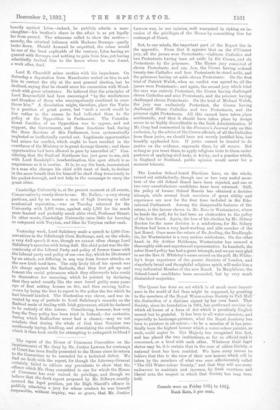Yesterday week, Lord Salisbury made a speech to 4,000 Con-
sorvatives in the Edinburgh Corn Exchange, and, on the whole, a very dull speech it was, though we cannot often charge Lord Salisbury's speeches with being dull. His chief point was the dis- continuity of the Liberal Party and policy of former times with the Liberal party and policy of our own day, which he illustrated by an attack, not differing in any way from former attacks, on 'the new Irish land-laws. The only lively bit of his speech was his charge against the Radicals, that they first get up and foment the social grievances which they afterwards take credit to themselves for removing, which be pointed by declaring that they acted exactly like the man found guilty some years ago of first setting houses on fire, and then earning
'crown by being the first to report to the police the fire which he had himself kindled. The illustration was clever, and was in- vented by way of prelude to Lord Salisbury's remarks on the Radical mode of dealing with Irish grievances, which he declared -to be entirely of this nature. Considering, however, how very long the Tory policy has been tried in Ireland,—for centuries, during which Radicalism never had a chance,—may we not retaliate that during the whole of that time Toryism was assiduously laying, kindling, and stimulating the conflagration, which it then took credit for attempting to extinguish in blood P






































 Previous page
Previous page